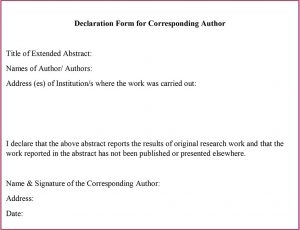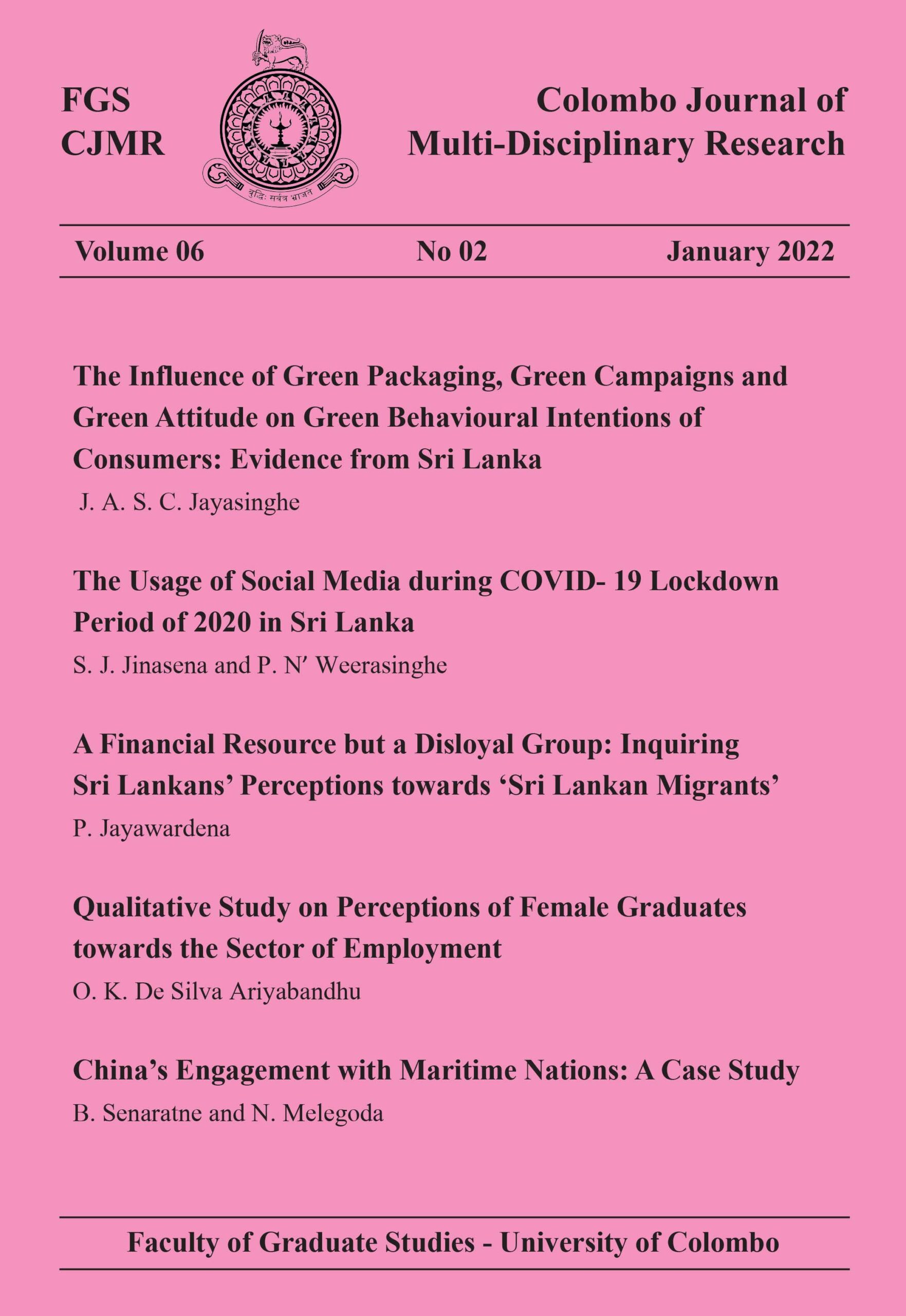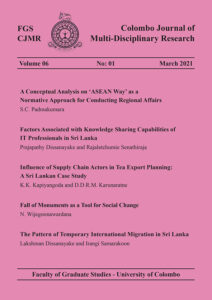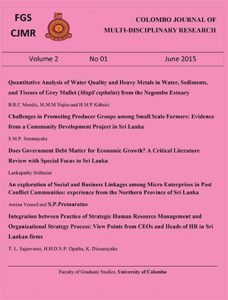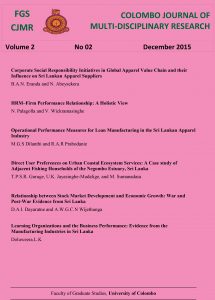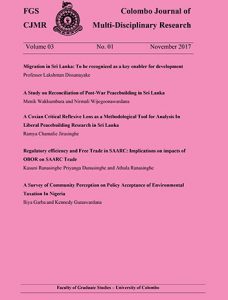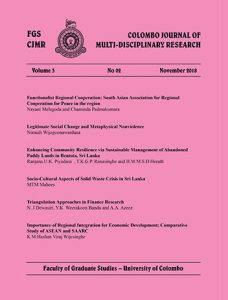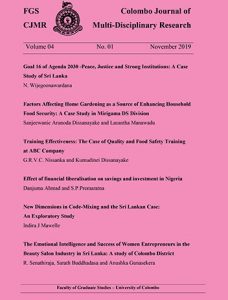
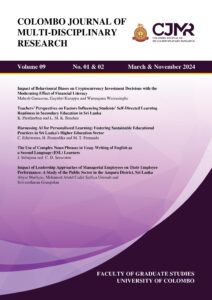
| Colombo Journal of Multi-disciplinary Research (CJMR), a bi-annual refereed publication, dedicated to publish articles, reviews and scholarly comments relating to any field of studies. The Journal is a multi-disciplinary, innovative and international in its approach. It will include theoretical and conceptual articles as well as empirical studies covering both historical and contemporary issues/ events. CJMR is published by the Faculty of Graduate Studies, University of Colombo, Sri Lanka.
ISSN 2362-0633 (print) |

The Colombo Journal of Multi-disciplinary Research (CJMR) publishes papers based on original research pertaining to all facets of development. Within this broad field, CJMR is particularly interested in receiving original research papers on the following areas: Economic development, labor markets, trade and regional integration.
|
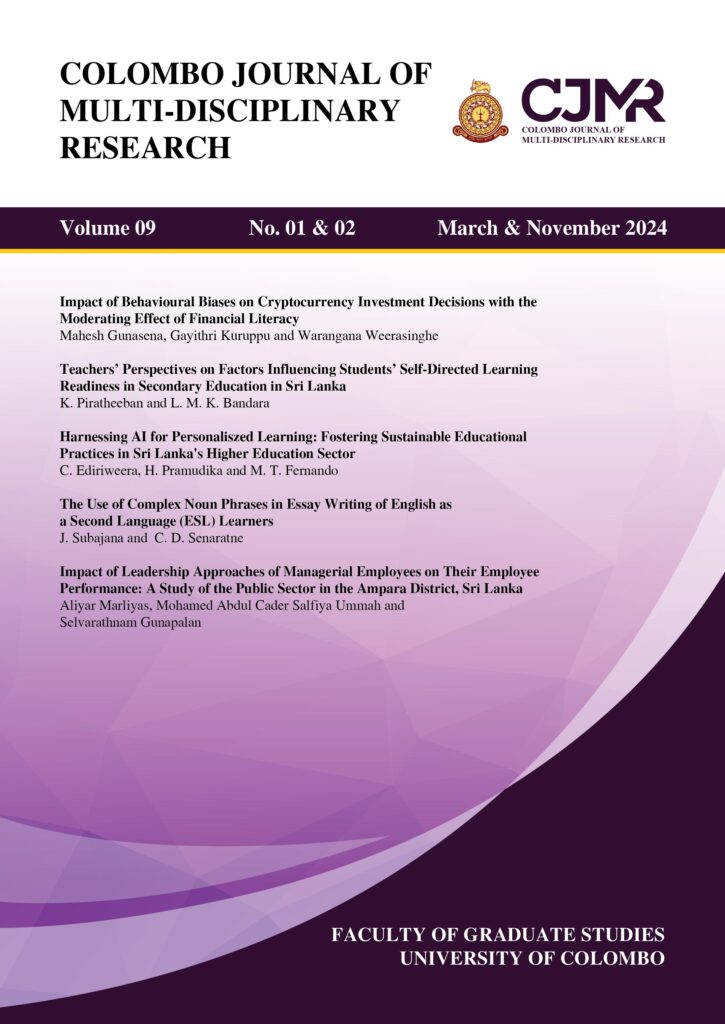
Editorial Advisory Board
| Name | Area of Specialization | Affiliation |
| Professor AA Azeez | Finance; Corporate Governance; Banking | Dean, Faculty of Graduate Studies, University of Colombo, Sri Lanka |
| Professor Gavin Jack | Management; Organizational Studies | Professor, University of Edinburgh Business School, United Kingdom |
| Professor Justin Craig | Family Enterprise; Social Entrepreneurship | Professor, Bond University, Bond Business School, Australia |
| Professor Tomohiro Machikita | Development Studies; Urbanization; Public & Labor Economics | Associate Professor, Center for Southeast Asian Studies (CSEAS), Kyoto University, Japan |
| Professor Subha Vishnudas | Sustainable Development; Science and Technology | Faculty of Engineering, Cochin University of Science and Technology, Cochin, India |
| Dr. DAS Atukorale | Computer Science; Information Engineering; ICT; e-Learning; | Director, University of Colombo School of Computing, University of Colombo, Sri Lanka |
| Professor Jennifer Perera | Medical Microbiology & Immunology | Emeritus Professor Faculty of Medicine, University of Colombo, Sri Lanka |
Editorial Board
| Name | Area of Specialization | Affiliation |
| Chief Editor | ||
| Professor MPP Dharmadasa | Family Business; Marketing; Corporate Governance; Strategic Management
|
Director of Studies (Research), Faculty of Graduate Studies, University of Colombo, Sri Lanka |
| Managing Editor | ||
| Mr. Sahan J. Fernando | Management; Small and Medium-sized Enterprises (SMEs) | Faculty of Management and Finance, University of Colombo, Sri Lanka |
| Editors | ||
| Professor Nalin Abeysekara | Marketing; Consumer Behavior; Digital Business | Faculty of Management Studies, The Open University of Sri Lanka, Sri Lanka |
| Professor Nirmali Wijegoonawardana | History; Conflict and Peace Studies | Faculty of Arts, University of Colombo, Sri Lanka |
| Dr. HMCJ Herath | Psychology; Social Work, Health Matters | Faculty of Health Sciences, The Open University of Sri Lanka, Sri Lanka |
| Dr. Jinendra Dissanayake | Environmental Science | Faculty of Science, University of Colombo, Sri Lanka |
| Dr. David Stoten | Learning, Education and Leadership | Newcastle Business School, Northumbria University, United Kingdom |
| Dr. Thusitha B. Abeysekara | Law; Human Rights; Data Protection & Information Privacy | Head/ Department of Legal Studies, Faculty of Management Studies and Commerce, University of Sri Jayewardenepura, Sri Lanka |
| Professor K Dissanayake | Management and Organization Studies | Faculty of Management and Finance, University of Colombo, Sri Lanka |
| Professor GD Samarasinghe | Marketing; Consumer behavior; Digital Business | Faculty of Business, University of Moratuwa, Sri Lanka |
| Professor DN Jayantha
|
Banking & Finance | Faculty of Management Studies, Sabaragamuwa University of Sri Lanka, Sri Lanka |
| Dr. Rubina Sahid
|
Banking and Finance | Hailey College of Banking & Finance, University of the Punjab, Lahore, Pakistan |
| Dr. Shamila Dawood | International Investment Law; Business Law; Contract Law; Legal Method | Faculty of Law, University of Colombo, Sri Lanka |
| Text Editors | ||
| Mr. WMSR Weerasekera | International Business; Cross Cultural Management | Faculty of Management and Finance, University of Colombo, Sri Lanka |

| Submitted papers must not be under consideration by any other publisher; authors must attest to this at the time of submission. It is also the author’s responsibility to disclose any potential conflict of interest regarding the submitted manuscript.
The CJMR is a peer-reviewed Journal and follows a two-step review process. All papers submitted to the CJMR are first scrutinized by the editors to determine their suitability. Papers found to be suitable are then assessed by peer reviewers in a double-blind review process. Papers should be formatted on MS Word and sent electronically to the Chief Editor at cjmr@fgs.cmb.ac.lk |
Call for Papers
Colombo Journal of Multidisciplinary Research (CJMR)
Faculty of Graduate Studies
University of Colombo
The Colombo Journal of Multidisciplinary Research (CJMR), a refereed research publication, publishes articles, reviews and scholarly comment on original research. The journal is multi-disciplinary, innovative and international in its approach. It includes theoretical and conceptual articles as well as empirical studies covering both historical and contemporary issues/events. CJMR is published by Faculty of Graduate Studies, University of Colombo.
Guidelines for Preparation of Research Papers
- Papers should be between 7000 to 8000 words in length. All papers must be accompanied by a short abstract in 200 words, full institutional affiliation, postal and email addresses and brief profile of the author/s.
- Papers submitted to CJMR must not be under consideration by any other publisher; authors must attest to this at the time of submission.
- Papers should be formatted in MS Word and sent electronically to the Editor at cjmr@fgs.cmb.ac.lk
- Submit your manuscript by filling extended abstract submission form
- Please send an email for any information to the edit at cjmr@fgs.cmb.ac.lk
Guideline for Manuscript Formatting
Manuscript Formatting
- All articles should be typed on one side of the paper (preferably A4) and 1.5 -spaced throughout (not only the text but also displayed quotations, notes, references and any other matter).
- Notes should be numbered serially and presented at the end of the article. Notes must contain more than a mere reference.
- British spellings be used throughout; universal ‘z’ in ‘-ize’ and ‘-ization’ words.
- Use single quotes throughout. Spellings of words in quotations should not be changed. When directly quoting from a work, include the page number in the citation.
- For exact measurements use only figures (3 km, 9 per cent not %). Use international number system (i.e., thousands, millions, billions, etc.).
- References are to be embedded in text in the anthropological style, e.g., ‘(Smith, 2012) Citations should be first alphabetical and then chronological, for example, (Ahmed, 2000, 2012; Daminda 1987, Vidanagama 1960)’. Citation styles: One Work by One Author: (Walker 2000); One Work by Multiple Authors: (Walker and Weerasinghe, 2000); Two or More Works by Different Authors in One Citation: (Balda, 1980; Kamil, 1988, Pepperberg & Funk, 1990); Two or More Works by the Same Author(s) in One Citation: (Edeline & Weinberger, 1991, 1993); Two or More Works Published in the Same Year by the Same Author(s): (Johnson, 1991a, 1991b, 1991c). (Silva et al., 2009), Silva et al. (2010) states …
- Tables and figures to be indicated by number (e.g., see Table 1), not by placement (e.g. see Table below). Short and crisp titles and headings in tables and figures are preferred. Present each table and figure on a separate sheet of paper, gathering them together at the end of article.
- All articles, books and theses should be listed in alphabetical order of author, giving the author’s surname first followed by initials. If more than one publication by the same author is listed, the items should be given in chronological order. Below are the few examples of APA style referencing (for detailed referencing style, please refer to the Publication Manual of the American Psychological Association):
Book
Andreasen, N. C. (2001). Brave new brain: Conquering mental illness in the era of the genome. Oxford, England: Oxford University Press.
Edited Book:
Teheranian, M., Hakimzadeh, F., & Vidale, M.L. (eds.). (1977). Communications policy for national development: A comparative perspective. London: Routledge&Kegan Paul Ltd.
Chapter in an Edited Book:
Ferres, K. (2001). Idiot box: Television, urban myths and ethical scenarios. In I. Craven (Ed.), Australian cinema in the 1990s (pp. 175-188). London, England: Frank Cass.
Journal Article: Online and Hardcopy
D’Haenes, L., Jankowski, N., & Heuvelman, A. (2004). News in online and print newspapers: Differences in reader consumption and recall. New Media &Society, 6(3), 363–382.
Storey, K. B. (2004). Functional metabolism: Regulation and adaptation. Retrieved from http://www.netLibrary.com/urlapi.asp?action=summary
Magazine Article:
Gowariker, I., & Anderson, P. (2009, August).Guided by Angels.Dare: Because Entrepreneurs do, 2, 18.
Newspaper Article:
Sengupta, D. (2009, December 2). Economy, Finance & Markets: Night lights to help figure out real economic growth now. The Economic Times, p. 7.
Website:
Sen, A. (2006, March 29). What clash of civilization? Why religious identity isn’t destiny. Retrieved 2 December 2009, from http://www.slate.com/id/2138731/
Website (no author or date):
Islam in India.(n.d.). Retrieved 2 December 2009, from http://adaniel.tripod.com/Islam.html
Unpublished Work:
Srivastava, N. (2008). Attrition: A critical trouble for Indian IT Companies. Unpublished dissertation thesis. Mudra Institute of Communications, Ahmedabad.
Conference Proceedings:
Schnase, J.L., & Cunnius, E.L. (Eds). (1995). Proceedings from CSCL ‘95: The First International Conference on Computer Support for Collaborative Learning. Mahwah, NJ: Erlbaum.
More cases consult APA referencing style.
Declaration Form for Corresponding Author
Submit the Manuscript
FGS – CJMR Journal – March & November 2024 – Volume 09 – No. 01 & 02

Impact of Behavioural Biases on Cryptocurrency Investment Decisions with the Moderating Effect of Financial Literacy
Mahesh Gunasena, Gayithri Kuruppu* and Warangana Weerasinghe
Teachers’ Perspectives on Factors Influencing Students’ Self-Directed Learning Readiness in Secondary Education in Sri Lanka
K. Piratheeban* and L. M. K. Bandara
Harnessing AI for Personaliszed Learning: Fostering Sustainable Educational Practices in Sri Lanka’s Higher Education Sector
C. Ediriweera, H. Pramudika* and M. T. Fernando
The Use of Complex Noun Phrases in Essay Writing of English as a Second Language (ESL) Learners
J. Subajana* and C. D. Senaratne
Impact of Leadership Approaches of Managerial Employees on Their Employee Performance: A Study of the Public Sector in the Ampara District, Sri Lanka
Aliyar Marliyas*, Mohamed Abdul Cader Salfiya Ummah and Selvarathnam Gunapalan
FGS – CJMR Journal – March & November 2023 – Volume 08 – No. 01 & 02
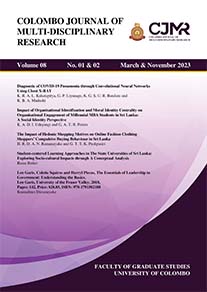
Diagnostic of COVID-19 Pneumonia through Convolutional Neural Networks Using Chest X-RAY
K. R. A. L. Kahatapitya, G. P. Liyanage*, K. G. S. U. R. Bandara and K. B. A. Madushi
Impact of Organisational Identification and Moral Identity Centrality on Organisational Engagement of Millennial MBA Students in Sri Lanka: A Social Identity Perspective
K. A. D. I. Udayangi* and G. A. T. R. Perera
The Impact of Hedonic Shopping Motives on Online Fashion Clothing Shoppers’ Compulsive Buying Behaviour in Sri Lanka
H. R. D. A. N. Ramanayake and G. T. T. K. Pushpasiri*
Student-centered Learning Approaches in The State Universities of Sri Lanka: Exploring Socio-cultural Impacts through A Conceptual Analysis
Rizna Bishri*
Book Review
Len Garis, Colette Squires and Darryl Plecas,The Essentials of Leadership in Government: Understanding the Basics, Len Garis, University of the Fraser Valley, 2018,
Pages: 142, Price: $28.85, ISBN: 978-1791502188
Kumudinei Dissanayake*
FGS – CJMR Journal – March & November 2022 – Volume 07 – No. 01 & 02
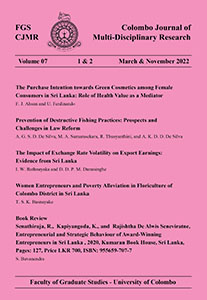
The Purchase Intention towards Green Cosmetics among Female Consumers in Sri Lanka: Role of Health Value as a Mediator
F. J. Ahsan* and U. Ferdinando
Prevention of Destructive Fishing Practices: Prospects and Challenges in Law Reform
A. G. S. D. De Silva*, M. A. Samarasekara, R. Thusyanthini, and A. K. D. D. De Silva
The Impact of Exchange Rate Volatility on Export Earnings: Evidence from Sri Lanka
I. W. Rathnayaka* and D. D. P. M. Dunusinghe
Women Entrepreneurs and Poverty Alleviation in Floriculture of Colombo District in Sri Lanka
T. S. K. Basnayake*
Book Review
Senathiraja, R., Kapiyangoda, K., and Rajishtha De Alwis Seneviratne, Entrepreneurial and Strategic Behaviour of Award-Winning
Entrepreneurs in Sri Lanka, 2020, Kumaran Book House, Sri Lanka, Pages:127, Price LKR 700, ISBN:955659-707-7
S. Buvanendra*
CJMR Journal January 2022 – Volume 06 – No 02
The Influence of Green Packaging, Green Campaigns and Green Attitude on Green Behavioural Intentions of Consumers: Evidence from Sri Lanka
J. A. S. C. Jayasinghe
The Usage of Social Media during COVID- 19 Lockdown Period of 2020 in Sri Lanka
S. J. Jinasena and P. N’ Weerasinghe
A Financial Resource but a Disloyal Group: Inquiring Sri Lankans’ Perceptions towards ‘Sri Lankan Migrants’
P. Jayawardena
Qualitative Study on Perceptions of Female Graduates towards the Sector of Employment
O. K. De Silva Ariyabandhu
China’s Engagement with Maritime Nations: A Case Study
B. Senaratne and N. Melegoda
CJMR Journal March 2021 – Volume 06 – No 01
A Conceptual Analysis on ‘ASEAN Way’ as a Normative Approach for Conducting Regional Affairs
S.C. Padmakumara
Factors Associated with Knowledge Sharing Capabilities of IT Professionals in Sri Lanka
Prajapathy Dissanayake and Rajaletchumie Senathiraja
Influence of Supply Chain Actors in Tea Export Planning: A Sri Lankan Case Study
K.K. Kapiyangoda and D.D.R.M. Karunaratne
Fall of Monuments as a Tool for Social Change
N. Wijegoonawardana
The Pattern of Temporary International Migration in Sri Lanka
Lakshman Dissanayake and Irangi Samarakoon
CJMR Journal March & November 2020 – Volume 05 – No 01 & 02
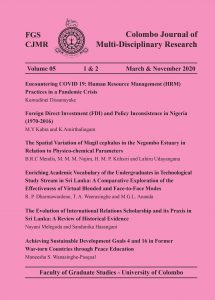
Encountering COVID 19: Human Resource Management (HRM) Practices in a Pandemic Crisis
Kumudinei Dissanayake
Foreign Direct Investment (FDI) and Policy Inconsistence in Nigeria (1970-2016)
M.Y Kabra and K. Amirthalingam
The Spatial Variation of Mugil Cephalus in the Negombo Estuary in Relation to Physico-chemical Parameters
B.R.C Mendis, M. M. M. Najim, H. M. P. Kithsiri and Lahiru Udayangana
Enriching Academic Vocabulary of the Undergraduates in Technological Study Stream in Sri Lanka: A Comparative Exploration of the Effectiveness of Virtual Blended and Face-to-Face Modes
R. P. Dharmawardene, T. A. Weerasinghe and M.G.L. Ananda
The Evolution of International Relations Scholarship and its Praxis in Sri Lanka: A Review of Historical Evidence
Nayani Melegoda and Sandunika Hasangani
Achieving Sustainable Development Goals 4 and 16 in Former War-torn Countries through Peace Education
Maneesha S. Wanasinghe-Pasqual

